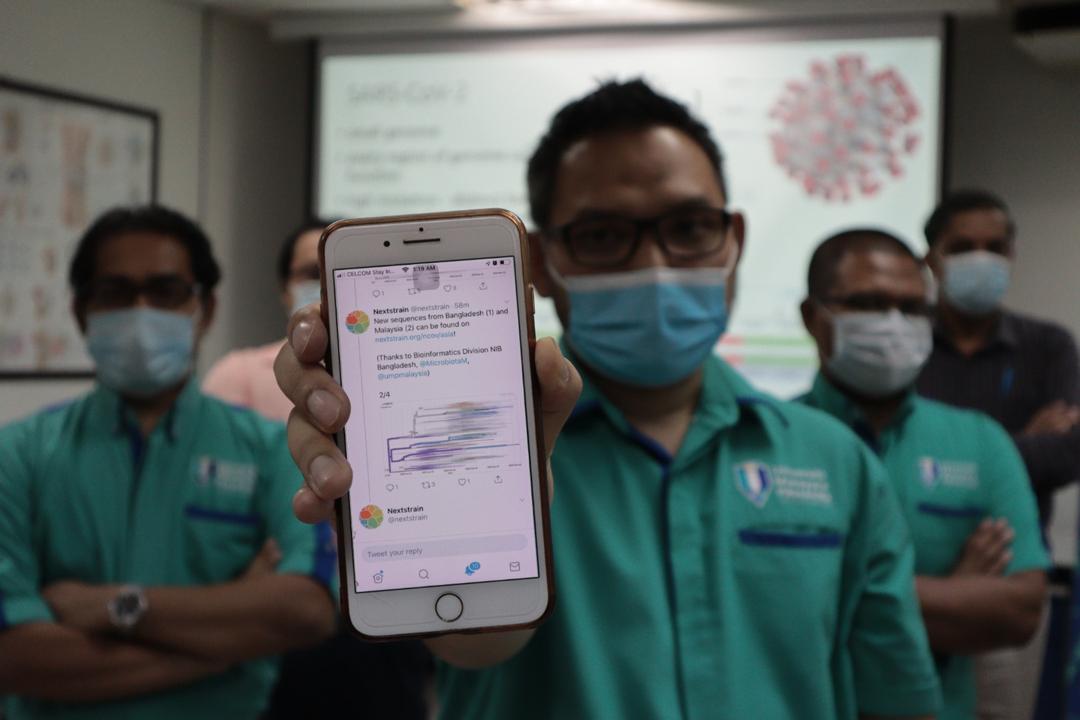UMP researcher finds different clade in Covid-19 genome sequencing result

Kuantan, 9 June 2020 – A researcher from Universiti Malaysia Pahang (UMP) who carried out a genome sequencing study, “Whole Genome Sequencing of Circulating Covid-19 Strains in Malaysia”, discovered a different lineage of the clade of Covid-19.
The team led by a researcher from the Faculty of Industrial Sciences & Technology (FIST), Dr. Hajar Fauzan Ahmad, 35 who has expertise in high-throughput sequencing, microbiome and metabolome sequencing from the University of Copenhagen, Denmark and now carries out research involving the sequencing of the Covid-19 virus that spread in this country.
According to Dr. Hajar, the early hypothesis states that this virus can easily change via mutations to the sequence of its genome.
“Early findings are proof that there is a different clade in Pahang compared to clades reported by other researchers.
“We know that viruses are a group of microbes that can easily mutate due to various factors.
“The situation is more alarming as the SARS-CoV-2 virus is a novel virus.
“Therefore we thought that we should sequence its genome to have a deeper knowledge of the enemy we are currently facing,” he said, having started the research project two months ago with expectations of results not too far off.
According to him, this effort could not succeed without collaboration with the International Islamic University of Malaysia (IIUM) Kuantan, notably Professor Dr. Ahmad Hafiz Zulkifly and Dr. Norhidayah Kamarudin together with the Public Health Laboratory in Johor Bahru that provided the virus RNA for this study.
“We process this RNA for sequencing and readings of the nucleic acid sequence data will provide insight on the clade, strain, variant and also the location of the mutations.
“This sequencing data is what we use to know more about this virus.
“The early findings of this study are proof that the virus has mutated and formed viruses with other variations.
“This information is important in developing a more sensitive and specific diagnostic detection method and also creating a vaccine that will offer effective protection for the population that may get infected in the future,” he said.
At this moment, the UMP COVID-19 team is actively studying a variety of clades, immune responses towards this specific clade and eventually building a diagnostic method that is sensitive and specific for this pandemic.
The sequencing project uses UMP funds. However, he is also involved with agencies such as the Malaysia Genome Institute (MGI) after being appointed as a joint researcher for the study of Genome Sequencing and Bioinformatic Analysis of Corona Virus 19 in Malaysia under the patronage of the Ministry of Science, Technology And Innovation (MOSTI).
Though it is still in its early stages, the clade that they sequenced has been evaluated by Gael Millot, a scientist from the Pasteur Institute, France, before being certified by the GISAID that functions to collect data on various types of coronavirus sequences that cause the spread of Covid-19 worldwide.
It provides the database and clinical epidemiological study for this SARS-CoV-2 virus.
Scientists interested in these discoveries can utilise the information that has been entered into this public database.
Besides that, this type of information is vital to bring public awareness about the dangers of the virus.
The discovery of the unique clade of the virus among the Pahang populace will be published academically soon.
He hopes that the efforts to sequence this virus will continue to expand to produce the best diagnostic method together with an effective vaccine to protect the public.
At the same time, the Dean of FIST, Associate Professor Dr. Mohd. Hasbi Ab Rahim said that UMP has expertise on genome sequencing and analysis that can be referenced.
“In fact, the Industrial Biotechnology programme at UMP also instils knowledge on genome sequencing and analysis in the curriculum that will inadvertently produce competent graduates in the future,” he said.
He also advised the public to be vigilant as we are facing a dangerous enemy and to always maintain social distancing, wear personal protective equipment (PPE), and wash their hands frequently.
Also present during the research interview was the Head of Programme (Industrial Biotechnology), Dr. Mohd Fazli Farida Asras along with other researchers, Professor Dr. Venugopal Jayarama Reddy, Dr. Ahmad Mahfuz Gazali and Ts. Muhammad Adam Lee Abdullah at the UMP Gambang Central Laboratory.
Dr. Hajar Fauzan has been involved with microbiome sequencing studies relating to groups of microbes found in the human body.
It is a relatively new but interesting field of study.
Microbiome has proven that humans have microbes (bacteria, fungi, virus and others) different from one another.
These microbes determine the healthiness of a person, besides the original human genome.
It is an interesting branch of study.
He is also active in elaborating the microbiomes found in sea cucumbers in Malaysian waters by using advanced sequencing methods to prove the existence of unexplored clades.


